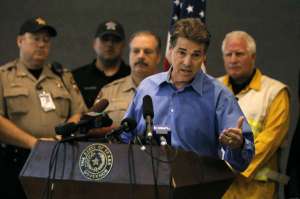
Texas Governor Rick Perry Credit: Eric Schlegel / Getty Images News
Republicans will be holding their latest Presidential debate in California tonight, and this one will be more newsworthy than most. It marks the debut of Texas Governor Rick Perry, the laconic latecomer who is currently trouncing the rest of the field. I don’t expect the environment or climate change to be a major topic at the debate, other than the usual Environmental Protection Agency bashing—after all, only Jon Huntsman actually professes a belief in global warming, and it’s entirely possible everyone will forget he’s on the stage. For his part, Perry has said repeatedly that climate change is just a theory—a theory he suspects is being ginned up by scientists hungry for funding. But really, there’s not much space between the major Republican candidates on this issue—they’re all extremely doubtful about global warming, at least now, and opposed to nearly all climate policies.
In that way the candidates are very much in line with ultra conservative Tea Party members, which shouldn’t surprise anyone—the Tea Party has dominated the early primary campaigning. But this might: Perry and the other major candidates actually seem to be well to the right of most Republicans on climate issues, let alone the rest of the country. That’s the conclusion of a new survey of more than 1,000 Americans on politics and global warming (PDF) by the Yale Project on Climate Change Communication. The pollsters found that while the Tea Party made up just 12% of respondents, they make up the bulk of hardcore climate skeptics: only 34% of them say they believe global warming is happening.
More from TIME: Texas Burns as the Rest of the Country Drowns
By comparison, 78% of Democrats and 71% of Independents believe that global warming is happening. That’s not too surprising, but the poll found that 53% of Republicans believe that global warming is happening. So a majority of Republicans, Democrats and Independents all believe that global warming is happening, yet the only Republican Presidential candidate who says he accepts the science on climate change is currently polling at about 1%.
Something’s not quite right here, and Brad Plumer at the Washington Post believes he knows why:
Yet even though climate skeptics constitute a minority of the population, they can still have a disproportionate impact. Researchers on cognitive social networks at Rensselaer Polytechnic Institute recently found that “when just 10 percent of the population holds an unshakable belief, their belief will always be adopted by the majority of the society.” It’s easy to think of counterexamples here (did the small core of birthers really win majority support?), but there does seem to be a tipping point at which a minority idea catches on broadly. The minority just has to believe what it believes with a fervent intensity.
More from TIME: Greens Are Justifiably Mad About the Oil Sands Pipeline. But Sitting Out 2012 Elections Would Be Insane
As Yeats would put it, ” the worst / are full of passionate intensity”—at least when it comes to climate change. But even fairly hardcore climate skeptics tend to support some basic green policies, like more funding for renewable energy research, and tax rebates for energy-efficient vehicles or solar panels. Does that mean many voters—Republican or otherwise—are likely to decide their support based on candidates’ energy and climate policies? Probably not—as Andrew Revkin at Dot Earth likes to say, the attitude of most of the public on climate and energy issues tends to be like water sloshing in a shallow pan, with little depth or commitment. But it’s still clear that only the most conservative Americans are as opposed to all climate policies as nearly the entire Republican Presidential field.
Bryan Walsh is a senior writer at TIME. Find him on Twitter at @bryanrwalsh. You can also continue the discussion on TIME’s Facebook page and on Twitter at @TIME


